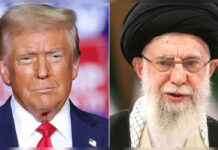X: @the_news_21
In a significant escalation of tensions in the Middle East, Israel has reportedly launched airstrikes against Iran, just days after Tehran unleashed a barrage of 300 projectiles towards the country. According to reports from Tehran’s Fars news agency, three explosions rocked an army base in Isfahan, indicating the intensity of the retaliatory strikes.
Iran’s state TV asserted that the country’s defense system successfully intercepted and destroyed three drones in the skies, underscoring the gravity of the confrontation between the two nations.
The latest exchange of hostilities comes in the wake of Iran’s first direct attack on Israel, purportedly in response to an alleged Israeli airstrike on the nation’s consulate in Damascus. With tensions already simmering, Iranian President Ebrahim Raisi had issued a stern warning, vowing severe repercussions for any infringement on Iran’s sovereignty.
Here are key developments in the Iran-Israel conflict:
- Unharmed Nuclear Facilities: Iran’s state media affirmed that nuclear facilities in Isfahan remained unscathed despite the reported airstrikes. As a precautionary measure, flight operations at major airports in Tehran, Shiraz, and Isfahan were temporarily halted.
- US Role and Sanctions: Reports indicate that the United States had prior knowledge of Israel’s retaliatory strike but did not endorse or partake in the operation. While affirming support for Israel’s defense, the US imposed new economic sanctions against Iran, signaling its stance on the escalating conflict.
- Iranian Defense Response: Iran reportedly deployed air defense batteries in Isfahan, targeting a major air base housing American-made F-14 Tomcats. However, official statements from Israel’s military and the White House are yet to be issued.
- Legitimacy of Response: Iranian officials justified their weekend attack on Israel as a legitimate response to alleged Israeli aggression in Syria. Iran’s foreign minister reiterated the nation’s commitment to defending its sovereignty, warning of decisive retaliation against any further provocations.
- International Concerns: UN Secretary-General Antonio Guterres expressed grave concerns over the escalating tensions, warning of the potential for a full-scale regional conflict. Emphasizing the need for restraint, he urged all parties to exercise caution to avert catastrophic consequences.
- Market Impact: Following reports of the airstrikes, oil prices surged over three percent in early Asian trade on Friday, reflecting investor anxiety over the destabilizing developments in the region.
As the situation in the Middle East continues to deteriorate, the specter of conflict looms large, posing profound implications for regional stability and global security. Amidst mounting tensions, diplomatic efforts to de-escalate the crisis remain imperative to prevent further escalation and mitigate the risk of widespread conflict.
Also Read: WHO Sounds Alarm Over Growing Spread of H5N1 Bird Flu Infections: Humans at Risk








Thank you for your sharing. I am worried that I lack creative ideas. It is your article that makes me full of hope. Thank you. But, I have a question, can you help me?
clomid for sale australia where to get clomid without prescription can you get clomiphene prices where to get cheap clomid without prescription how to buy generic clomiphene tablets buy cheap clomid price buying clomiphene price
This is the kind of delivery I recoup helpful.
More articles like this would make the blogosphere richer.
order zithromax pills – order ciprofloxacin pills purchase metronidazole for sale
purchase semaglutide without prescription – buy periactin pills for sale buy periactin generic
order motilium 10mg generic – motilium 10mg generic buy flexeril
buy augmentin 625mg without prescription – https://atbioinfo.com/ buy acillin cheap
nexium for sale online – https://anexamate.com/ nexium online buy
warfarin without prescription – https://coumamide.com/ order hyzaar online
buy prednisone 20mg sale – aprep lson prednisone price
the blue pill ed – erectile dysfunction medicines buy ed pills
buy generic amoxicillin – comba moxi buy amoxicillin online cheap
diflucan price – cost diflucan 200mg fluconazole 100mg tablet
cenforce 100mg pills – https://cenforcers.com/# buy generic cenforce over the counter
ranitidine brand – this purchase zantac
This is the type of delivery I unearth helpful. https://gnolvade.com/
100mg viagra safe – strong vpls buy generic viagra new zealand
Thanks for putting this up. It’s evidently done. https://buyfastonl.com/
This is the type of delivery I unearth helpful. https://ursxdol.com/sildenafil-50-mg-in/
I couldn’t turn down commenting. Warmly written! https://prohnrg.com/product/loratadine-10-mg-tablets/
More posts like this would create the online time more useful. https://aranitidine.com/fr/lasix_en_ligne_achat/
Thanks towards putting this up. It’s understandably done. https://ondactone.com/simvastatin/
This is the tolerant of advise I turn up helpful.
cost cozaar
Thanks on putting this up. It’s understandably done. http://seafishzone.com/home.php?mod=space&uid=2294015
pill forxiga 10 mg – https://janozin.com/ where can i buy forxiga
buy xenical pill – https://asacostat.com/ generic xenical
Thanks for sharing. I read many of your blog posts, cool, your blog is very good. https://www.binance.info/es-MX/register-person?ref=JHQQKNKN
More articles like this would make the blogosphere richer. https://myvisualdatabase.com/forum/profile.php?id=118753
Can you be more specific about the content of your article? After reading it, I still have some doubts. Hope you can help me.
More posts like this would force the blogosphere more useful. TerbinaPharmacy
This is the description of serenity I enjoy reading.
kuwin sở hữu kho game đa dạng từ slot đến trò chơi bài đổi thưởng, mang đến cho bạn những giây phút giải trí tuyệt vời.
利用强大的谷歌蜘蛛池技术,大幅提升网站收录效率与页面抓取频率。谷歌蜘蛛池
专业构建与管理谷歌站群网络,助力品牌实现全域流量的强势增长。谷歌站群
Đến với J88, bạn sẽ được trải nghiệm dịch vụ cá cược chuyên nghiệp cùng hàng ngàn sự kiện khuyến mãi độc quyền.
kuwin sở hữu kho game đa dạng từ slot đến trò chơi bài đổi thưởng, mang đến cho bạn những giây phút giải trí tuyệt vời.
Tham gia cộng đồng game thủ tại Go88 để trải nghiệm các trò chơi bài, poker phổ biến nhất hiện nay.
usa online casino
best online sportsbook
casino online australia
betmgm Alabama betmgm-play betmgm DE
Immerse in the symphony of spinning reels and cheering wins. In crown coins casino, cashback offers soften any losses. Spin with confidence today!